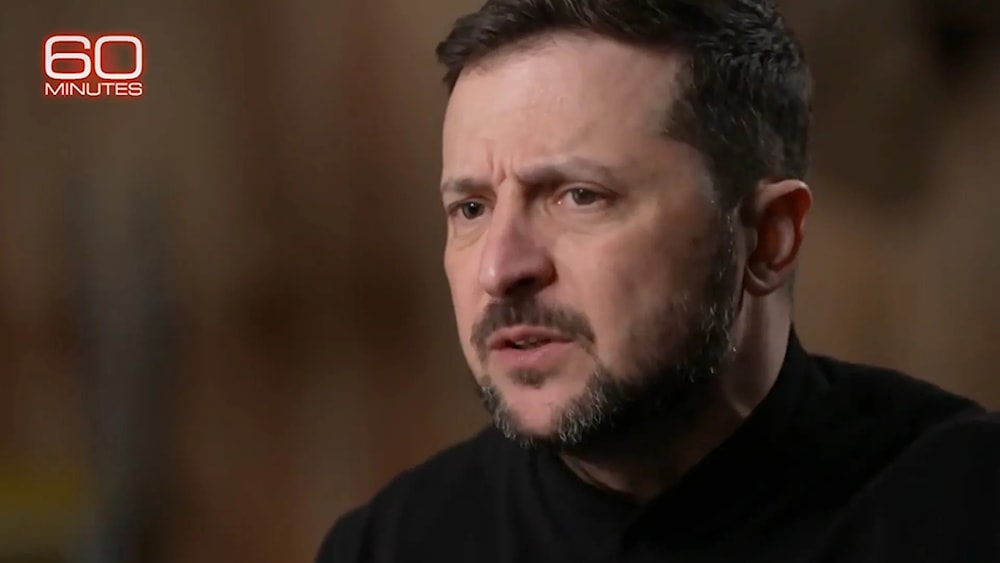Zelensky accuses Vance of 'justifying Putin's actions'
Ukrainian President Volodymyr Zelensky, in a powerful 60 Minutes interview, invited Donald Trump to visit Ukraine and warned against a growing US alignment with Putin's narrative.
-

Ukrainian President Volodymyr Zelensky speaking during his interview on CBS' "60 Minutes" on April 13, 2025. (ScreenGrab/60 Minutes)
Ukrainian President Volodymyr Zelensky, in a Sunday interview with '60 Minutes' on CBS, invited President Donald Trump to visit Ukraine and reflected on his tense February meeting at the White House.
Speaking through an interpreter, Zelensky noted that the US has experienced "a shift in tone" and "a shift in reality," implying that Russian President Vladimir Putin’s messaging has influenced the Trump administration, specifically calling out Vice President JD Vance.
“I don't want to engage in the altered reality that is being presented to me,” Zelensky told CBS' Scott Pelley during the interview, which was filmed in his hometown of Kryvyi Rih—just days after a Russian missile strike near a playground was reported to have killed 10 adults and nine children.
Zelensky said, addressing Trump's false claims in February that Ukraine had started the three-year-old war, that "First and foremost, we did not launch an attack."
"It seems to me that the vice president is somehow justifying Putin's actions," Zelensky said of Vance, who accused him during their White House meeting of showing disrespect and of misleading visitors by taking them on "propaganda tours."
'We are the victim': Zelensky
"I tried to explain, You can't look for something in the middle. There is an aggressor, and there is a victim. The Russians are the aggressor, and we are the victim," added Zelensky in the interview that was filmed on Friday, the day White House envoy Steve Witkoff met with Putin in Russia.
Representatives for the White House and Vice President JD Vance did not immediately respond to Axios' request for comment Monday evening.
During the interview, Zelensky switched to English as he made a direct appeal to Trump, saying Ukrainians “want you to come” and witness the situation firsthand, adding "Please, before any kind of decisions, any kind of forms of negotiations, come to see people, civilians, warriors, hospitals, churches, children destroyed or dead."
"Come, look, and then let's move with a plan how to finish the war. You will understand with whom you have a deal. You will understand what Putin did. ... You can go exactly where you want, in any city which been under attacks."
Zelensky switched back to Ukrainian as he paused to answer Pelley's question about whether he thinks the US has Kiev's back.
"I want to answer truthfully and quickly that the United States is our strategic, strong partner. But the pause is doubt," he said, adding, "I don't doubt that the people of America are with us. But in a long war, many details are forgotten. In Europe, everyone fears that the United States may drift away from Europe."
"I think without the United States we will suffer great losses. Human and territorial. So, I wouldn't like to consider that. But this is our destiny, our land, our life. One way or another, we will end this war."
Zelensky and Trump
The relationship between Zelensky and the White House has shown a sharp decline in recent weeks. In the latest incident, Zelensky publicly denounced on April 5 the US Embassy in Kiev for issuing what he called an alarmingly weak statement following a deadly missile strike in Kryvyi Rih—his hometown—that left 18 civilians dead, including nine children.
The strike, which took place on April 4, hit a residential area in central Ukraine. According to Zelensky, 62 others were injured. Despite the scale of the tragedy, the US response avoided holding Russia explicitly responsible.
"Such a strong country, such a strong people — and such a weak reaction," Zelensky wrote on social media. "They are even afraid to say the word 'Russian' when talking about the missile that killed the children."
His dissatisfaction with Washington doesn't end here, late last month, he fired back at Trump's envoy to the Middle East, Steve Witkoff, hurling accusations of Witkoff being pro-Russia during an interview on March 27.
Zelensky made remarks in which he accused Witkoff, a key official involved in opening negotiations on resolving the Ukraine conflict, of aligning with Moscow and providing assistance to Putin.
“I believe that Witkoff really does quote Kremlin narratives very often. I believe that this will not bring us closer to peace. And I believe that, unfortunately, this will weaken the American pressure on Russia. We can only fix this information backdrop through our actions. We’re trying to do that,” Zelensky said.
Earlier last month, the Trump administration halted fresh arms supplies to Ukraine and considered suspending weapons shipments from US stockpiles, threatening Kiev's capacity to continue the war against Russia, The Wall Street Journal reported, citing current and former US officials.
The decision to potentially shut down the primary channel for weaponry deliveries to Ukraine came days after a tense exchange between President Trump and Ukrainian President Volodymyr Zelensky at the White House. Immediately after, concern spread across Europe that the US may be abandoning the larger Western alliance.

 5 Min Read
5 Min Read











